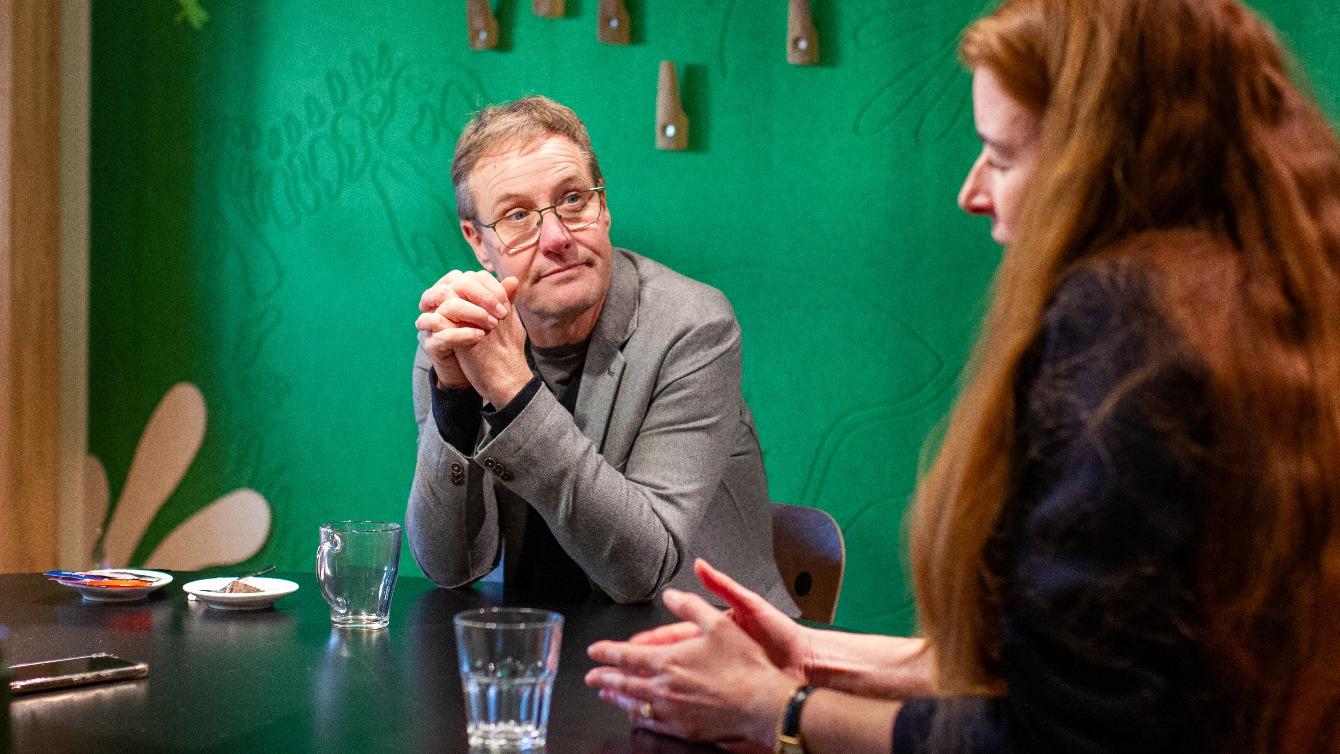Kees Klomp has just returned from a conference in England, where he also spoke as a guest speaker. 'It was really bizarre. I was standing in front of a room full of salespeople who were only talking about market share and profit maximization. It was as if we were still in the nineties. As if we weren't facing an enormous crisis.'
Klomp wrote about this impending crisis in the ‘Groene Troonrede’ in September. When he lined up the facts, he himself was overwhelmed by the bleakness of the future that emerged. 'I spent almost the entire month of July with the curtains closed. Because it hit me so hard. Unconsciously, I still believed in a miracle, that everything would eventually turn out fine with planet earth.’
Dystopian view
In his ‘Groene Troonrede’, Klomp describes that, to end ecological degeneration and destruction, not only must CO2 emissions be reduced (stopped), but the collapse of biodiversity is equally urgent. The World Economic Forum has calculated that about half of all global economic activity depends on nature. British researchers have calculated that the UK's gross domestic product will decline by twelve percent in the coming decades due to the loss of ecosystem services (services of natural ecosystems, such as clean air, drinking water, fertile soils, and crop pollination). The sum of biodiversity loss and global warming: famines, geopolitical conflicts, and mass migration due to heatwaves, devastating wildfires, floods, and storms.
Nevertheless, Klomp has opened the curtains again and speaks wherever he can. At the end of November, he was a guest at the CSO (Chief Sustainability Officer) network meeting organized by PwC in Leiden. There he spoke with Wineke Ploos van Amstel-Haagsma, the CSO of PwC Netherlands.
She shares Klomp's concerns. "Biodiversity loss is a gigantic problem that is only getting bigger, and we will increasingly feel its consequences," agrees Ploos van Amstel. "At the moment, we are not sufficiently aware of this. And if we are actually aware of it, we think it is very complicated. Companies often find it complex because the effect of biodiversity loss is indirect and varies locally. Moreover, global warming and CO2 can be clearly measured. Biodiversity is measured locally, so you cannot rely on standard methods. Therefore: unknown makes unloved, which adds to the complexity.
‘Transport arteries, such as the Rhine, will be obsolete for that purpose by 2050 according to scientific studies.'
Kees Klompimpact maker, author and program manager
Kees, has anything changed in your story since you wrote the ‘Groene Troonrede’?
"Yes, but not in a positive way. Empirical research initially projected an economic contraction of nineteen percent by 2050 with a warming of less than 2.5 degrees. That now appears too optimistic; new studies speak of an economic contraction of at least thirty percent between now and 2075. This simply means a collapse of the financial system. The problem is that the financial economy is many times larger than the real economy. Take, for example, the Port of Rotterdam. Tens of thousands of people are employed there. They all essentially work for foreign investment capital. This inevitably comes at the expense of real jobs.
Klomp: "People have no idea what's going on. Many people don't notice any difference. Only when you really start paying attention, like when you walk through a forest, can you notice what's happening. Biodiversity is also more urgent because it is irreversible. A species that goes extinct does not come back. This has direct consequences for our survival as humanity. Climate change can still be mitigated in some areas; biodiversity loss cannot.
What needs to change to get companies on board?
Ploos van Amstel: "The current standards for non-financial reporting are a step in the right direction. However, many companies see it as a cost to comply with them. While integrating sustainability – and thus also biodiversity – into the business model is essential for long-term commercial success and avoiding business risks."
"Producers of apples and pears see their crops fail because there are too few bees," adds Klomp. "So, as strange as it sounds, I think the speed at which the disruption is now happening helps to wake everyone up."
"For many other organizations, this is a challenge," says Ploos van Amstel. "How do you create transparency around biodiversity, how do you make it measurable? Even among sustainability experts, there is still insufficient knowledge in this area. The fact is that executives currently have a lot on their plate. They face various challenges and often want to achieve many things: promoting diversity, sustainable business practices, meeting compliance requirements, and being a good employer at the same time. But ultimately, they have to make choices. And don't forget; profit has to be made. Often, sustainability only comes into the picture after other priorities have been checked off."
Klomp: "The problem is that we ask companies to adjust their operations. But the market is not geared towards incorporating non-material value. Companies that stick their necks out often see their competitive position deteriorate. And that is, of course, disastrous.
We need to move away from incrementalism – small steps that fundamentally change nothing. The government plays a crucial role in this. If the playing field is made fair for all companies, then you can deal with non-material value in a completely different way. Companies need to be much more assertive and demand different policies from the government.
‘Integrating sustainability into the business model is essential for long-term commercial success and avoiding business risks.'
Wineke Ploos van Amstel – HaagsmaChief Sustainability Officer at PwC
Can the business sector take responsibility if governments fail?
Klomp: "The business sector cannot solve everything because they are bound by shareholders and consumers. The problem is that their interests often conflict with what companies need to do to ensure sustainability. Operating sustainably often means being more expensive, more complex, and less profitable in the short term. What I genuinely don't understand is that companies, despite all the data and evidence about the economic impact of sustainability, still hesitate. It's all about hard cash, and yet we keep kicking the can down the road."
According to Klomp, the climate and biodiversity crisis will inevitably lead to the de-internationalization of the global economy in the coming decades. "Many companies depend on a well-functioning physical infrastructure. Take water transport arteries, such as the Rhine, for example. According to scientific studies, such arteries will be obsolete for that purpose by 2050. In the summer, the water level is too low, and the rest of the year, the route is unreliable due to fluctuating levels. And other countries will be hit even harder by warming and the loss of ecosystem services. Take a country like Mozambique. It's far away, but what we conveniently forget is that various raw materials and products are produced there that need to reach us. And that won't be possible any longer.
Preparing for the future
At Windesheim University of Applied Sciences, Klomp has the task as program manager to prepare students for the future, which may look very different from what they currently think. "Should we continue to educate our students with the idea that they will start a reasonably nice, comfortable, and recoverable existence? 95 percent of the curriculum is still focused on that."
"With a scientific perspective, you know that this is an illusion. We have a moral dilemma. When are we going to tell them the truth? Should we even do that, is it up to us? But you also can't take them through an educational system for four or five years, pretending that all is going well in this world.
To strengthen his argument and reach a large audience, Klomp will launch his book 'Ecoliberalism' early 2025. 'In it, I outline a new perspective, being an ecological perspective on the economy. I show how we can fundamentally reorganize the economy based on ecological science. I propose creating a new eco-social contract as the basis for a democracy in which nature rights are fully integrated.
Sustainability: opportunity for companies
Ploos van Amstel: "I would like to end on a positive note. We are currently not tackling the problems fast enough. But I have been in the sustainability field for almost twenty years now, and if I look at the speed with which we have been working on this in recent years, it is positive. I think of new legislation and regulations, but also the awareness of the sustainability topic across the business sector; it is no longer just a sustainability department topic. As mentioned, organizations can be commercially successful for much longer if they integrate sustainability and biodiversity into their business model. That is hopeful."
Klomp: "I agree with that. We need to reinvent ourselves, so I also find it a very interesting time. Let the smart, creative people come to the table to get started on this.
Contact us

Wineke Ploos van Amstel - Haagsma
Chief Sustainability Officer, PwC Netherlands
Tel: +31 (0)65 170 13 44
















